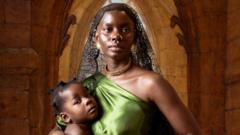Dola Posh, known for her vibrant photography, found herself grappling with a profound loss of identity after the birth of her daughter during the COVID lockdown. Six days postpartum, she lay in a hospital bed, feeling disconnected from herself in a world suddenly filled with uncertainty and pressure. "I thought: ‘I’m me; the baby’s out, I’m still me.’ But no, I wasn’t me any more," she shared, revealing the deep impact of postnatal depression—a condition that disproportionately afflicts black women.
With family far away and the anxiety of a difficult pregnancy lingering, Dola struggled to navigate her new reality. The unsolicited advice piled on during a time when she needed space only compounded her feelings of inadequacy. “It made me feel like I didn’t know what I was doing. I wasn’t given the chance to be a mother,” she recalled.
In her darkest moments, the isolation compounded her anxiety to a breaking point; a voice urged her towards despair. Yet in the depths of her struggle, Dola found her voice through photography. Inspired to document her journey, she began to create self-portraits that captured not just her experiences but also her relationship with her daughter, Monioluwa, meaning "I have God" in Yoruba.
The therapeutic art allowed her to explore her emotions, evoking a connection with her upbringing and the religious imagery of motherhood in Western art. With a lens turned inward and a commitment to break the silence surrounding her pain, Dola transformed her experience into a project that resonates with broader audiences.
As Dola gained recognition for her work, she began to share her story publicly, shedding light on the importance of addressing postnatal depression. By winning an award from Leica earlier this year, she seeks to empower other black mothers to confront their struggles without stigma. “I want them to look in the media and see a reflection of themselves trying to make things work,” Dola said passionately.
Through her journey, Dola advocates for openness and understanding, reminding the world that it’s okay to struggle and that art can serve as a powerful tool for healing and connection.
With family far away and the anxiety of a difficult pregnancy lingering, Dola struggled to navigate her new reality. The unsolicited advice piled on during a time when she needed space only compounded her feelings of inadequacy. “It made me feel like I didn’t know what I was doing. I wasn’t given the chance to be a mother,” she recalled.
In her darkest moments, the isolation compounded her anxiety to a breaking point; a voice urged her towards despair. Yet in the depths of her struggle, Dola found her voice through photography. Inspired to document her journey, she began to create self-portraits that captured not just her experiences but also her relationship with her daughter, Monioluwa, meaning "I have God" in Yoruba.
The therapeutic art allowed her to explore her emotions, evoking a connection with her upbringing and the religious imagery of motherhood in Western art. With a lens turned inward and a commitment to break the silence surrounding her pain, Dola transformed her experience into a project that resonates with broader audiences.
As Dola gained recognition for her work, she began to share her story publicly, shedding light on the importance of addressing postnatal depression. By winning an award from Leica earlier this year, she seeks to empower other black mothers to confront their struggles without stigma. “I want them to look in the media and see a reflection of themselves trying to make things work,” Dola said passionately.
Through her journey, Dola advocates for openness and understanding, reminding the world that it’s okay to struggle and that art can serve as a powerful tool for healing and connection.




















